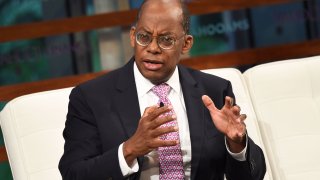
- TIAA CEO Roger Ferguson emphasized the benefits of a diverse and inclusive workplace.
- The firm’s practices have enabled it to put together a highly rated fund family.
- The Covid-19 pandemic has highlighted and exacerbated wealth disparities in the U.S.
Diversity in the workplace isn't just the right thing to do, it's also the most profitable thing to do, outgoing TIAA CEO Roger W. Ferguson Jr. told CNBC.
"It actually is economically a smart thing to do from a standpoint of business," Ferguson told CNBC's Sharon Epperson as part of the network's Inclusion in Action forum. "There are more and more studies that show diversity in the boardroom, diversity in C-suites, leads to better performance both in terms profitability, stock market performance … there are many ways in which diversity is the right thing to do and the smart thing to do."
Getting a better mix of both workers and executives has taken corporate focus in light of last year's protests against racial injustice, as well as growing wealth and income disparities in the U.S.
Get New England news, weather forecasts and entertainment stories to your inbox. Sign up for NECN newsletters.
The Covid-19 pandemic has turned a spotlight on the issue as well, with women and those at the bottom of the income ladder – often people of color – taking a far greater economic hit from the business lockdowns put into effect.
Ferguson noted the shrinking middle class and its declining share of the income base as evidence that "the benefits are not spread evenly or equitably across society."
"When I think of inclusive capitalism, I think of a society that is not only benefiting but also a more equitable distribution of the benefits," he said.
Money Report
Federal Reserve economists have estimated that the unemployment rate for the bottom fifth of earners is in excess of 20% while the overall jobless level is 6.2%. While falling sharply from the early stages of the pandemic, the unemployment rate is 9.9% for Black people and 8.5% for Hispanics.
The unemployment rate for women is 6%, but that has come amid a slide in the labor force participation rate from 58.4% prior to the pandemic to 56.3% in February.
Helping performance
Ferguson, who is leaving his TIAA post at the end of March, said trying to avoid those kinds of disparities has made the financial services firm stronger.
"Running a diverse and inclusive organization as best we can we think has been beneficial for everybody," he said.
He noted that TIAA's hiring process pays close attention to diversity, doing so by making sure it has an inclusive panel used to screen potential candidates. That approach has brought rewards to the company as it has managed $1.3 trillion in funds.
The firm's funds ranked in the top 12 for five-year performance in a recent Barron/Lipper fund survey.
"We have an aspiration for our company to look as much like America as much as it possibly can," Ferguson said.
Ferguson's successor will be Thasunda Brown Duckett, a J.P. Morgan veteran and one of the top Black executives on Wall Street. That she also contributes to the company's diversity profile is just a benefit of getting someone so qualified, Ferguson said.
"What's very, very important is she actually is a superb business leader. When you add that to the other components … in terms of gender and race, indeed we have made history here, one Black CEO succeeded by another," he said.
Duckett will be the third African-American to lead the firm, with the first being Clifton R. Wharton Jr., from 1987 to 1992.
While he is stepping away from the company, Ferguson said he will not be idle. He's been mentioned as a possible appointee in the Biden administration, though he said whatever work he takes on will have the same theme of promoting the virtues of diversity.
"There's opportunity basically in analyzing the facts, making policy changes in the public sector, and then having the business sector also play its role as a producer of jobs and a producer of wealth," he said. "I intend to be very active."






